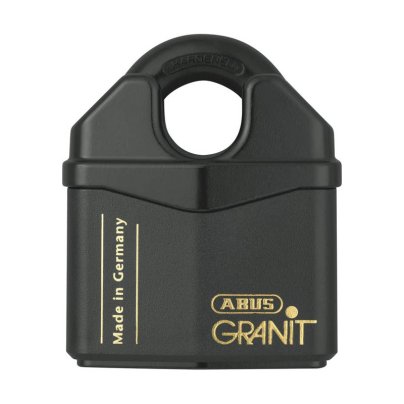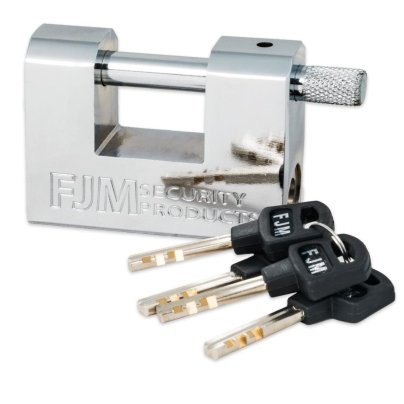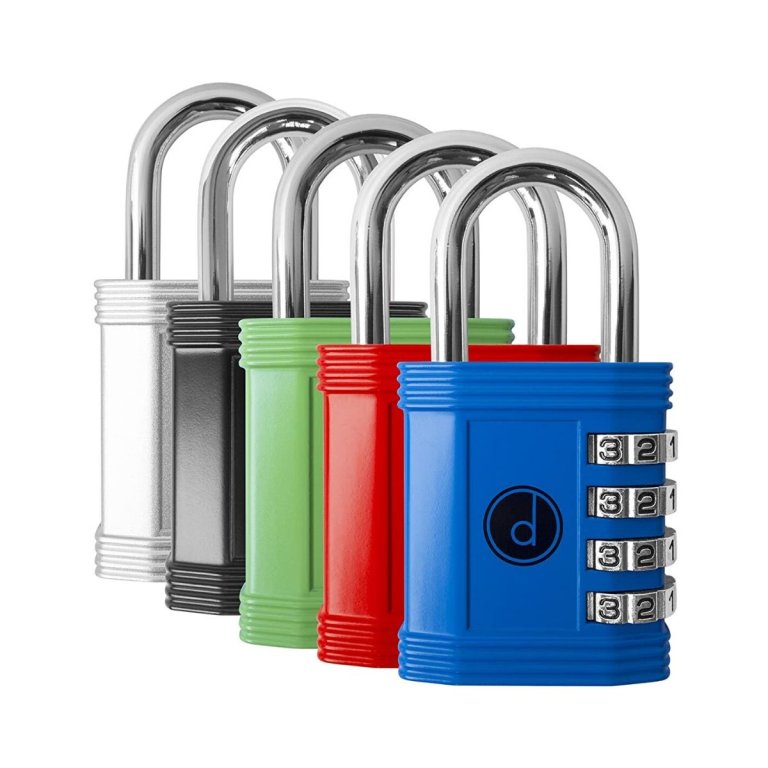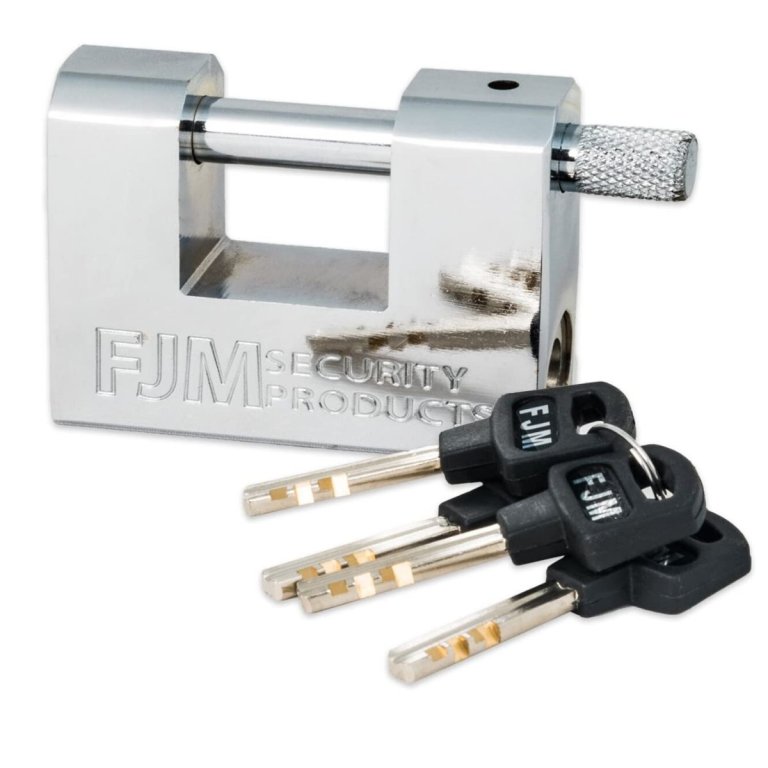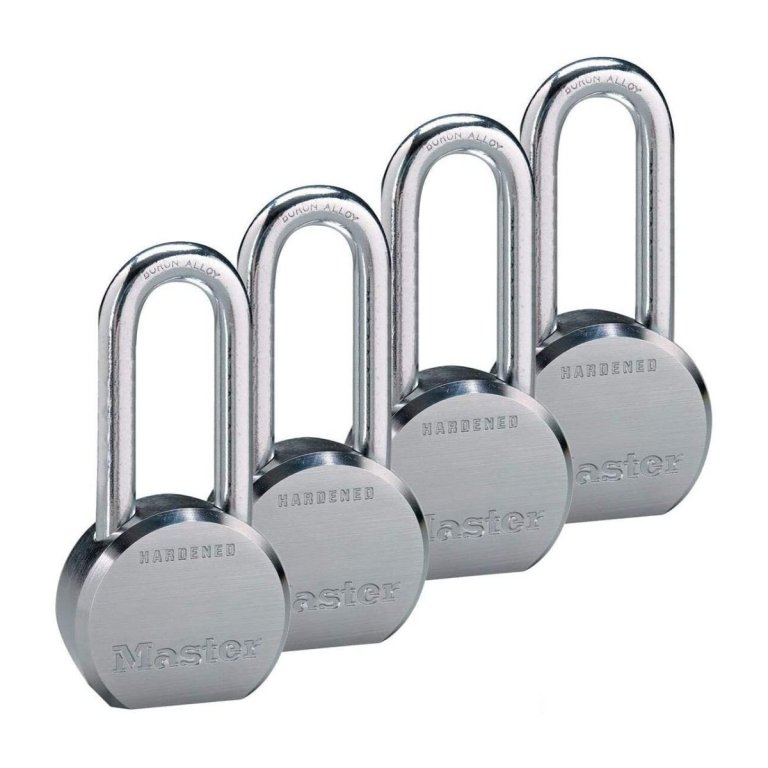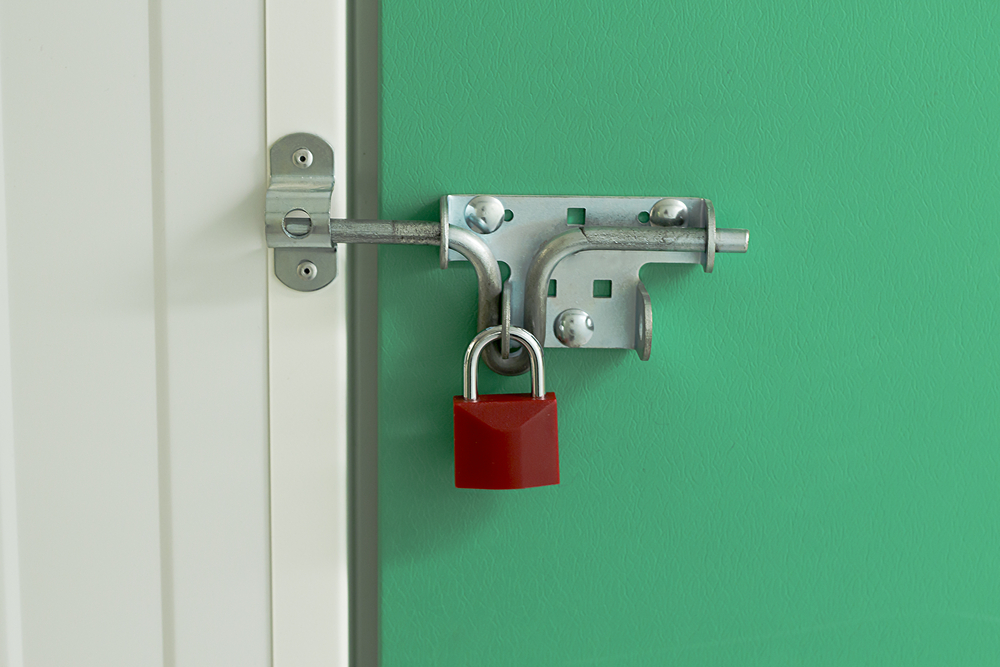
We may earn revenue from the products available on this page and participate in affiliate programs. Learn More ›
Quality matters, especially where security is concerned. Inferior padlocks tend to frustrate users in one of two ways, either by falling apart or by freezing up. The best padlocks, on the other hand, function smoothly and last a long time. Read our guide to understanding and differentiating between the many padlock options available today—and don’t miss our top picks, below!
- BEST OVERALL: ABUS Granit Plus Padlock
- BEST BUDGET: Desired Tools 4-Digit Combination Lock
- BEST FOR OUTDOOR USE: FJM Triple Chrome Plated D-Shaped Padlock
- HONORABLE MENTION: Master Lock Padlock with BumpStop Technology
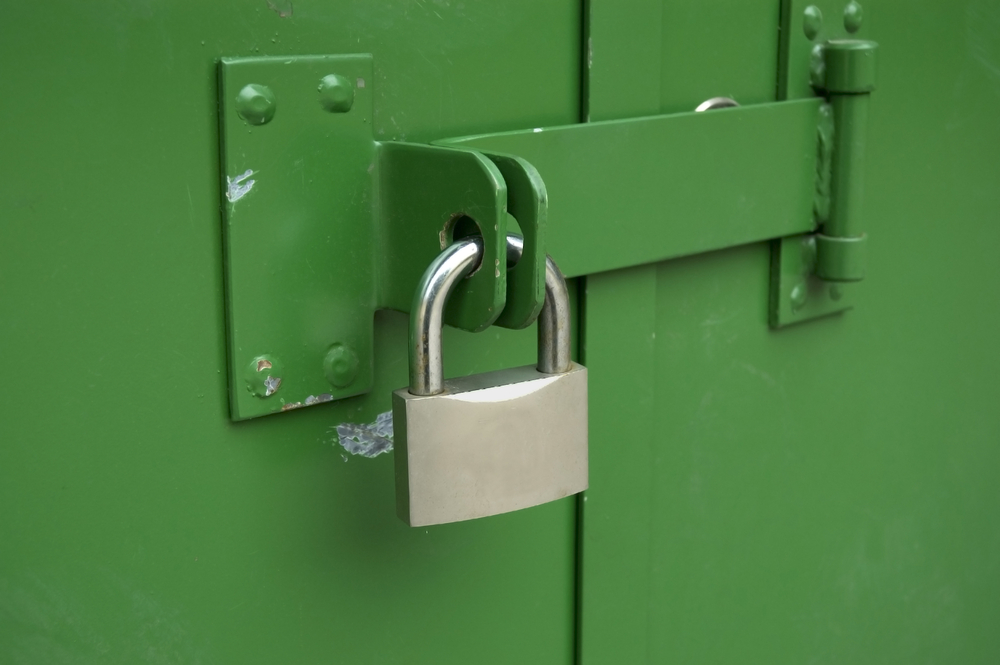
Types of Padlocks
Padlocks come in two main standards: Keyed and combination. The type is not determined by how the padlock looks, but in the mechanism used to open the lock. As indicated by their names, you use a key to access a keyed padlock and enter a series of numbers to open a combination padlock. Beyond this simple difference, this article describes the locking mechanisms more thoroughly below.
Keyed Padlocks
Keyed padlocks require that a key be inserted into the lock to slide several locking pins into position before you can open the lock. A locking pin is a thin, metal pin that slides within the core of the padlock. Each pin must be set at a specific height by the key to turn the drum and open the lock. Keys that do not have the correct cut will not position the pins correctly, and you will be unable to open the lock.
This padlock style is the most secure against lockpicks, but you will have to keep track of the key.
Combination Padlocks
Combination padlocks use a numbered combination to rotate several cams into a position to allow the shackle to be released. Cams are small discs that have an indentation in them. The shackle is released when every cam’s indentation lines up together, and the lock opens. A shackle is the curved, metal bar that opens or locks in place.
Combination padlocks are suitable for inexpensive items that people wouldn’t go to a lot of trouble to steal, or for relatively safe areas, like a school. While you won’t have to worry about a key, overall, they are the weaker option in terms of security.
Features to Look For
When shopping for a new padlock, it’s essential to understand the characteristics that best exemplify a quality product. While a hammer may benefit from simplicity, a padlock should have a moderate amount of complexity to keep your possessions secure. We address a few of the most prominent features to consider below.
Shackle Material
The shackle is the most exposed part of a padlock. As a vulnerable point on an otherwise wholly secure design, padlock manufacturers generally use a sturdy material to prevent damage. Shackle material types can include brass, stainless steel, hardened steel, hardened boron steel alloy, boron carbide, and molybdenum steel alloy.
Brass and stainless steel are lower quality options that offer minimal protection against impact, though stainless steel shackles are outdoor rated due to its corrosion resistance.
Hardened steel and hardened boron steel alloy are the midrange types of material used to make shackles. They undergo a heat treatment to create a hardened outer layer, though some power tools can still cut through them.
Boron carbide and molybdenum steel alloy are the most durable and most expensive shackle material option. While you won’t have to worry about them going missing, you may be out a few dollars in the short term.
Shrouded Shoulders
Shrouded shoulders or closed-shackle padlocks have metal covers that protect the exposed shackle. The padlock’s shoulders are the metal sides that rise to cover the shackle’s left and the right sides.
Padlocks that incorporate shrouded shoulders into their design are more resistant to power tools and prying bars, as the shroud prevents access to the shackle. However, this same protection can make them difficult to use, as the added bulk of the cover reduces the size of the opening on the lock. Some locks offer a removable shackle option that completely detaches from the body to allow better access to minimize this issue with the shoulders.
Number of Pins in Key
The number of pins determines the level of protection against lockpicks. As a rule, the more pins that a padlock has, the more secure the lock will be.
A key moves pins up to align the bottom portion below the shear line, and the upper part of the pin is seated above the shear line. As indicated by the name, the shear line is where the pin must sit for it to turn within the core. Once all pins align with the shear line, the drum can rotate freely within the padlock’s core.
Pin configurations can range from as low as a simple 3-pin padlock to complex 7-pin padlocks, though most padlocks sit in the middle of the scale with a 5-pin core.
Keep in mind people can still pick a padlock with a pin by using a hammer and a specially-designed bump key. This technique is known as bumping, and the hammer’s kinetic force transfers through the core, causing the pins to jump. A bump stop safety feature is available to block the transfer of kinetic energy, preventing this growing method of lockpicking.
Alternative protection against bumping is the disc detainer. Also called a disc tumbler lock, this combination lock features discs rotated into a particular position to release the shackle, in the same way as a dial moves the cams into position. The difference between these and regular combination locks is that the discs in a disc tumbler lock are moved by a key that has grooves to push the discs into position. These locks cannot be bumped and do not use springs, so they make great alternatives for freezing climates.
Removable Core
A removable core is excellent if you are looking for a padlock for a rental facility or storage container. You can change the center of the lock, without having to replace the lock itself. The core of the lock is the internal mechanism that contains the pins and the drum.
To remove the core, you need a master key, which pushes a locking pin into an alternate shear line that disengages it from the lock, instead of turning the drum within the core. Reasons you’d want to replace a core include those that are damaged or tampered with, ones that correspond to a key belonging to a renter, who has recently given up their rental or was evicted. This ensures someone can’t use a duplicate key to re-enter the premises, and you don’t have to purchase a new lock every time you rent a space for a new person.
Anti-Drill Plate
Locks can be drilled by inserting a drill bit into the lock at a specific point and applying pressure and torque with the drill to break the pins at the shear point, allowing the lock to be opened. This method of lock picking destroys the lock’s core but keeps the body intact.
An anti-drill plate is made of ceramic or hardened metal inserts. These inserts are placed into the lock to protect it from any attempt to drill the pins. The plate deflects the drill bit, or rotates within the lock, preventing the drill from gaining purchase or pushing further into the lock.
Lock Size
The bigger the lock, the more secure it is because thicker metals are more resistant to breaking. Also, larger lock bodies provide more space for additional pins or internal safety features, and internal locking mechanisms can also be larger and more robust.
However, there is one significant downside to a large lock: The weight. Some heavy-duty ones can weigh over two pounds on their own, making them poor substitutes for a simple locker combination lock.
Also, keep in mind that the larger a lock is, the larger the shackle diameter. If the lock is too big, it may not be able to loop through the chain or the hasp staple.
Our Top Picks
Best Overall
ABUS Granit Plus Padlock
This top pick is known as the ‘insurance lock’ because it offers the minimum level of protection you need to insure property under Swedish insurance standards. With 25,000 pounds or 12.5 tons of tensile strength, no one can pry apart this lock. Shrouded shoulders protect the shackle from cutting tools, and the shackle can be completely removed to make up for the loss of accessibility.
The ABUS Granit Plus Padlock even has a hardened steel anti-drill plate for additional protection, and the disc tumbler lock is bump-proof. However, at 2.4 pounds, this padlock is massive. Before buying, make sure that the shackle is small enough for your desired purpose.
Best Budget
Desired Tools 4-Digit Combination Lock
The bright color makes this padlock easy to pick out in a crowded gym locker room or at school, and you can set the four-dial configurations to 10,000 different combinations. Don’t worry about using a forgettable code; the Desired Tools 4-Digit Combination Padlock lets you set your own.
At just five ounces, it can be carried in a backpack, bag, or even in a pocket without significant issue. However, don’t expect this lock to be an excellent solution for a storage shed or valuable property. It isn’t robust enough to last long against a determined assault. But at the low price, it is an ideal option for casual use.
Best for Outdoor Use
FJM Triple Chrome Plated D-Shaped Padlock
The straight, horizontal shackle on this D-shaped lock removes the U-shaped shackle’s exposed vulnerability. This shackle style significantly reduces weak spots on the lock, and it also sets the entrance at a horizontal angle, allowing rain and snow to slide away from the lock instead of settling within the access point.
The triple chrome plating keeps the internal mechanisms protected against rain, snow, and even from the water in marine applications. At 1.2 pounds, this padlock is an ideal solution for storage lockers, and the disc tumbler lock won’t suffer from freezing temperatures.
Honorable Mention
Master Lock Padlock with BumpStop Technology
The Master Lock High Security Pro Series Padlocks come with BumpStop Technology, which interferes with bumping, an emerging lock-picking technique, by preventing the transfer of force from the bump key to the pins.
A hardened-boron alloy shackle helps to stop the lock from being cut, and a 5-pin core poses a challenge for lockpicks. Chrome rustproofing over a hardened steel body allows this padlock to be used outdoors, while still maintaining its strength over time. At 1.68 pounds, this padlock isn’t light and is a good option for a shed or motorcycle.
FAQs About Padlocks
While padlocks may seem like straightforward tools, they have a complexity that has been increasing for almost 2,000 years, which is why the intricacies can be challenging to understand. Below are answers to common questions surrounding padlocks.
Q. What padlock cannot be picked?
There are no locks immune to lockpicking. Locks are designed to open, so picking a lock comes down to experience with that type of lock, knowledge about the shortcomings of the lock, and the ability to create a key. The best locks tend to be relatively unknown, because the less someone understands about their functionality, the longer they will remain unpicked.
Q. What is the best outdoor padlock?
The best outdoor padlocks typically feature weather-resistant designs, such as a hardened steel body, chrome plating, and horizontal shackles to protect the lock’s mechanisms. Straight shackle padlocks feature a flat design that doesn’t expose the locking bar to falling precipitation or water accumulation.
